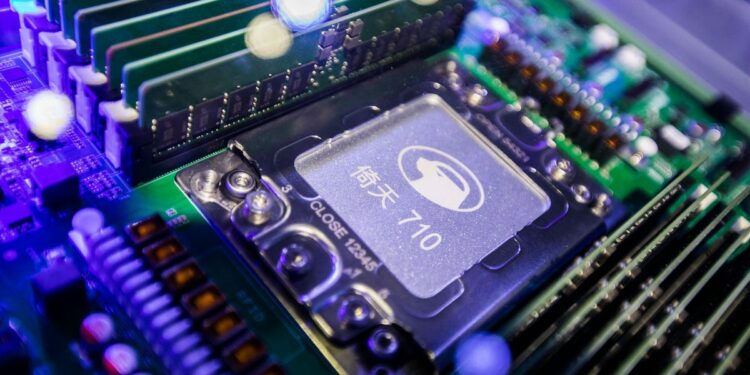As Russia further invaded Ukraine last week, the West is deploying an arsenal of painful sanctions against Moscow, targeting energy projects such as Nord Stream 2, Russian debt trade limitations, financial systems such as SWIFT, and the flow of high-tech goods including advanced computer chips. President Joe Biden has asked Singapore, Japan, and Taiwan – all three being major producers of semiconductors and other high-tech products – to support severe sanctions and export controls against Russia while the invasion wages on.
Semiconductors are essential components in electronic devices, including electric vehicles (EVs), smartphones and other consumer electronics, medical and military equipment, heavy machinery, smart grid, batteries, and virtually all computer systems. Semiconductor manufacturing is an incredibly complex process and requires a slew of strategic minerals such as silicon and neon (as it so happens, Ukraine supplies 90% of U.S. grade neon for semiconductors).
The U.S. – led tech embargo on Russia comes as the world is experiencing a semiconductor chip shortage, primarily due to supply chain issues from the pandemic combined with a robust resurgent demand. All three Asian countries engaged by President Biden are leading semiconductor manufacturers and producers of other technological exports that Russia relies on for the healthy functioning of its economy. The Taiwan Semiconductor Manufacturing Company (TSMC) is the world’s leading semiconductor foundry and accounts for over 90% of global chip output.
TSMC builds many of Russia’s central processing units (CPUs). Russia’s Elbrus CPUs, designed domestically but manufactured by TSMC, are used in Russian desktops, workstations, and servers and are known for their reliability and security. Most notable is the use of Elbrus chips by Russia’s military and security services in some of their computing applications.
In 2021, Japanese exports of electronic equipment to Russia totaled $348.19 million. Prime Minister Kishida recently announced that Japan will impose sanctions on semiconductors, high-tech products, and Russian financial institutions. The country also joined a number of other countries in expelling certain Russian banks from the SWIFT payment system.
Moreover, Singapore accounts for 19% of the global share of semiconductor equipment, with Russia in 2019 importing approximately $10.6 million worth of semiconductor devices from the Southeast Asian city-state.
The Russian economy has already begun to feel the effects of sanctions, with the Russian MOEX Index plummeting as much as 50% and the ruble reaching a record low, down as much as 40% against the U.S. dollar.
Russia is not alone in its dependence on Southeast Asian producers for semiconductors. The region accounts for 75% of global production, with Taiwan producing 92% of the world’s most advanced chips. And while China currently lacks the technological know-how to mass-produce the most advanced chips (though it has invested hundreds of billions of dollars in semiconductor manufacturing over the past few decades), it dominates the extraction and refining of global critical mineral supply chains, which are absolutely vital to semiconductor production.
The United States is just now beginning to acknowledge this critical vulnerability. The U.S. share of global semiconductor manufacturing stood at around 37% in 1990 but has fallen to about 12% as of now. The CHIPS Act, a multibillion-dollar bill to advance semiconductor manufacturing in the U.S., was recently passed by the House. While the legislation will likely be substantially revised to address concerns raised by the GOP, the act includes $52 billion in grants and subsidies for the domestic semiconductor industry and $45 billion to bolster supply chains for high-tech products.
Advancing semiconductor manufacturing in the U.S. will be a long-term process that will require foreign investment due to a reliance on foreign supplies of materials and processes. The CHIPS Act is set to benefit the U.S. semiconductor industry; however, the U.S. along with other major importers of high-tech products, must acknowledge their unsustainable dependency on chips from across Asia to develop smart grid, renewable energy, electric cars, and other 21st century technologies.
America’s private sector is being proactive in addressing these supply chain issues.
In an attempt to reduce its reliance on Asian chip manufacturers, Tesla
TSLA
in 2016 set out to produce its own in-house chips. Silicon is most commonly used in the production of semiconductors; thus, Tesla sought out an alternative to power their EVs – silicon carbide (SiC). Other companies, such as Apple, Amazon, Facebook, and Baidu, recognizing their increasing dependence on standard semiconductors outsourced from Asia and in light of the current global chip shortage, are now also looking towards developing certain aspects of chips in-house.
As a number of countries begin to rally behind Ukraine, U.S. Ambassador to Japan Rahm Emanuel, in his statement at the Foreign Correspondents’ Club of Japan, noted that “Japan’s swift response in collaboration with the United States and other G7 members, the European Union, and Australia to implement financial sanctions… and restrict the exports of semiconductors and high-tech products will impose unprecedented economic costs on Russia.”
On Friday, Taiwan’s Premier Su Tseng-chang announced that Taiwan “…will impose sanctions [on Russia] following other democratic countries.” TSMC also came out and stated that “TSMC complies with all applicable laws and regulations and is fully committed to complying with the new export control rules announced.”
U.S. sanctions alone cannot prevent Russia from continued military escalation. Hence assistance from major tech producers, such as Singapore, Japan, Korea, and Taiwan, is crucial. In the last century, the Coordinating Committee for Multilateral Export Control (COCOM) contributed lots to ensure the USSR’s technological backwardness. However, the Obama Administration rejected this author’s suggestions to revive COCOM as they glibly proclaimed that they did not want a return to the Cold War. Today, revived and organized export controls would bar sensitive tech inputs that Russia requires to diversify its economy and advance its military sector. The U.S. must work with its European and Asian allies to limit the vital supply of these key technologies and components to aggressive Russia in order to change its imperialist foreign policy and abuse of its neighbors.
With assistance from Julianna Rodrigues











